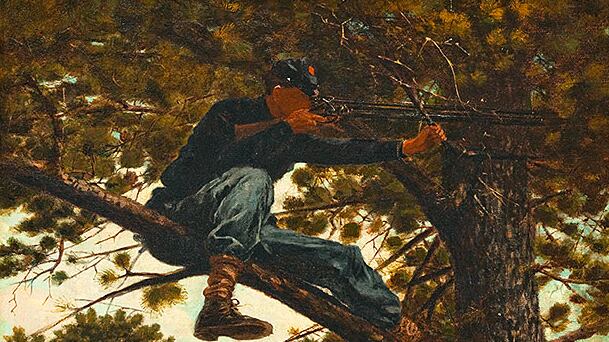Cross-posted from the Huffington Post, where Steve Clemons and I debate the following: "Obama's drone policy is a threat to American liberty." My answer is below. Clemons' reply can be read at the Huffington Post, where you can also vote on who provides the more persuasive answer.
During the Civil War, Union snipers aimed at Confederate officers. They did so because killing officers demoralized and disorganized rebel units, a valid military necessity. Every one of those Confederate officers was an American citizen. None of them got a jury trial. If they came into view … bang.
Was it a war crime to shoot down a Confederate officer?
Why not?
Within the technology of the time, that person was "targeted" just as surely as any Yemeni al Qaeda operative. The sniper didn't know the officer's name or life story. But in the words of the painter Winslow Homer - who witnessed sniper operations during the 1862 Peninsula campaign: sharp-shooting “struck me as being as near murder as anything I could think of in connection with the army.”
War means fighting, and fighting means killing. Those were the words of General Sherman1 150 years ago, and they remain true today. They are terrible words, because war is a terrible thing. But there is one thing even more terrible than war, and that is, failing to defend your country against those who have decided to make war against you.
On September 18, 2001, Congress authorized the president to take military action against the terrorist organization that struck the United States on 9/11.
[T]he President is authorized to use all necessary and appropriate force against those nations, organizations, or persons he determines planned, authorized, committed, or aided the terrorist attacks that occurred on September 11, 2001, or harbored such organizations or persons, in order to prevent any future acts of international terrorism against the United States by such nations, organizations or persons.
That resolution remains in force today. It assigns to the president - not to some judge - the authority to determine who committed the 9/11 attacks. It assigns to the president - not a jury - the responsibility to prevent any future acts of international terrorism. It does not exempt American citizens from the list of "nations, organizations, or persons" against whom the war is to be waged.
Let's make the discussion less abstract, more real world.
Steve, I don't think you'd dispute that Anwar al-Awlaki - the American-born cleric killed by drones in Yemen in September 2011 - was an active and important member of al Qaeda. He preached to three of the 9/11 hijackers in Falls Church, Virginia. He e-mailed extensively with Nidal Hasan, the Fort Hood gunman. He recruited Umar Farouk Abdulmutallab, the Nigerian underwear bomber.
If a team of Navy Seals had tracked al-Awlaki into Yemen, then airdropped in front of him and shot him dead, there'd be no more criticism than there was of the similar operation against bin Laden. Criticism seems primarily to turn on the fact that the president used a drone instead of a Seal team. But that's just a matter of using new technologies that put fewer American lives at risk, to achieve the ends stipulated by Congress a decade ago.
Executive power run amok? On the contrary: President Obama is using military power precisely and judiciously, in full compliance with law, against people who have chosen war against their own country. The way we make war changes with the times. The war-making power of the presidency remains essential to national security. And we should recognize that necessity whether we happened to vote for the president of the day or not.
Footnote: The quote: "War means fighting, and fighting means killing" should have been cited as being from Nathaniel Bedford Forrest. We regret the error.






